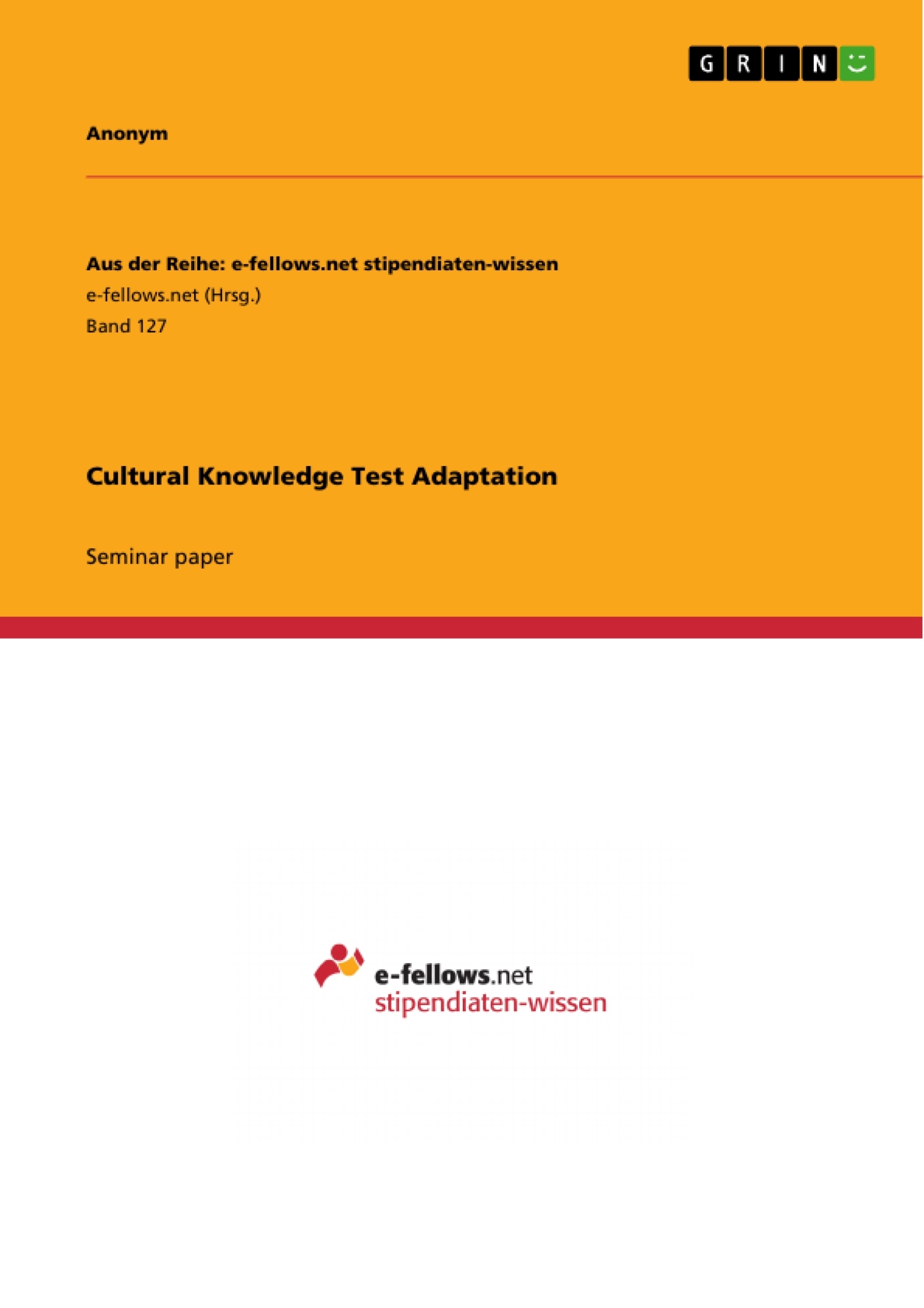Cultural intelligence (CQ) is “an individual’s capability to adapt effectively to new cultural contexts” (Early & Ang, 2003, p. 59). To measure CQ the Cultural Research Group at Florida Tech University have used a multidimensional scale with four specific components which they use as the initial indicators of CQ: Cognitive CQ, Meta-Cognitive CQ, Motivational CQ, and Behavioral CQ. The Cultural Intelligence Scale (CQS) was developed by Ang, (Ang et al, In Press) to assess CQ. The content validity of this model has serious problems as there are many important indicators of Cultural Knowledge missing. The missing elements impair the ability of the test to accurately measure cultural knowledge. Some indicators which we believe are missing include time perception and eating behavior and traditional foods. Also it is much more useful to combine the indicator “Language” together with the indicator for “non verbal displays” because separating the variables loses important areas like greetings and verbal communication displays that may not exactly fall under language or non-verbal displays. Thus we suggest an indicator for verbal and non verbal communication as this includes both language and non verbal displays but also provides for questions about greetings and colloquial speech. Lastly we also suggest that the indicator “Arts and Crafts” should be replaced with the indicator Arts which would cover cultural areas such as music, theater, and artwork that were previously left out by the original construct. After fixing the problems of content validity in our questionnaire it is apparent this questionnaire is extremely adaptable to other cultures. All items on the questionnaire should be etic as they are assessing knowledge that anyone could know. Thus for applying the construct to German culture it was unnecessary to change the construct at all. All indicators are relevant and would be understood by Germans. Therefore for German culture the construct (when corrected for content validity) is again the latent construct of Cognitive CQ with the indicators Legal and Economic Systems, Verbal and Non-verbal Communication Rules, Religion and Values, Marriage Systems, Arts, Geography, Time Perception, and Eating Behavior and Traditional Foods. Thus it is unnecessary to redraw the measurement model. Also as all aspects of this survey are etic there is no change in the items from one culture to another.
Inhaltsverzeichnis (Table of Contents)
- ASSESSMENT OF THE CONSTRUCT
- REVISION OF ORIGINAL ITEMS AND ADAPTATION FOR USE IN GERMAN
- VALIDATING THE QUESTIONNAIRE
Zielsetzung und Themenschwerpunkte (Objectives and Key Themes)
This paper explores the adaptation of the Cultural Knowledge Test (CKT) for use in a German context. The primary objective is to assess the validity and reliability of the modified instrument, focusing on the construct of cultural intelligence (CQ). This paper also aims to demonstrate the adaptability of the CKT to different cultures, showcasing its potential as a tool for measuring cultural knowledge and understanding across diverse populations.
- Construct validity of the Cultural Knowledge Test
- Adaptation of the CKT for German culture
- Translation and back-translation of questionnaire items
- Validation study for the modified instrument
- The relationship between cultural knowledge, cultural experience, and intelligence
Zusammenfassung der Kapitel (Chapter Summaries)
- ASSESSMENT OF THE CONSTRUCT: The chapter discusses the construct of cultural intelligence (CQ) and the Cultural Intelligence Scale (CQS). It examines the specific components of CQ, particularly Cognitive CQ, and outlines the methodology used by Van Driel et al. to assess this construct.
- REVISION OF ORIGINAL ITEMS AND ADAPTATION FOR USE IN GERMAN: This chapter focuses on the modifications and adaptations made to the original CKT to ensure its suitability for a German audience. It addresses issues related to cultural relevance, language equivalence, and the clarity of questionnaire items.
- VALIDATING THE QUESTIONNAIRE: This section describes a proposed validation study to assess the reliability and validity of the modified CKT. The study will involve a sample of German and English speakers, and will use measures of cultural experience and intelligence to evaluate the instrument's convergent, divergent, and criterion validity.
Schlüsselwörter (Keywords)
The primary keywords and focus topics of this paper include cultural intelligence, cultural knowledge, Cultural Knowledge Test (CKT), adaptation, translation, back-translation, construct validity, convergent validity, divergent validity, criterion validity, cultural experience, and intelligence. The paper also explores the relationship between these concepts and their implications for measuring and understanding cultural differences.
Frequently Asked Questions
What is Cultural Intelligence (CQ)?
CQ is an individual's capability to adapt effectively to new cultural contexts. It consists of cognitive, meta-cognitive, motivational, and behavioral components.
What are the indicators of Cognitive CQ?
Indicators include knowledge of legal and economic systems, communication rules, religion, marriage systems, arts, geography, and cultural norms like time perception.
How was the Cultural Knowledge Test (CKT) adapted for German culture?
The adaptation focused on linguistic equivalence and cultural relevance. Since the items assess general knowledge ("etic"), the core construct remained largely the same for the German context.
Why were some original test items revised?
Original items were revised to improve content validity. For example, "Language" and "Non-verbal displays" were combined to better cover greetings and colloquial speech.
What is the purpose of the validation study?
The study aims to ensure the test is reliable and valid by comparing results between German and English speakers and checking correlations with cultural experience.
- Citar trabajo
- Anonym (Autor), 2008, Cultural Knowledge Test Adaptation, Múnich, GRIN Verlag, https://www.grin.com/document/175338



